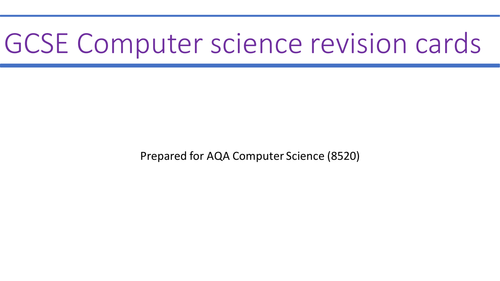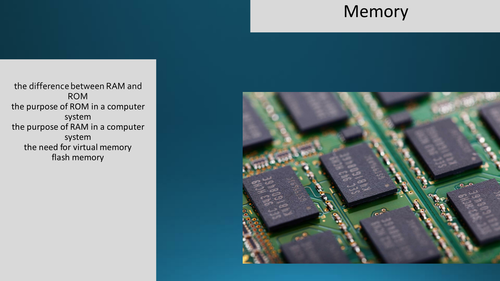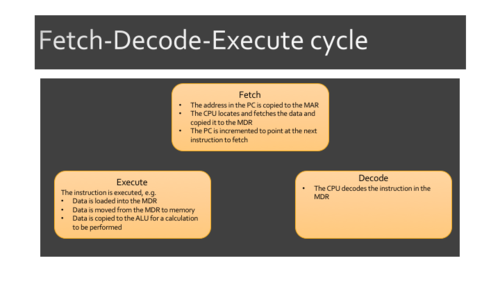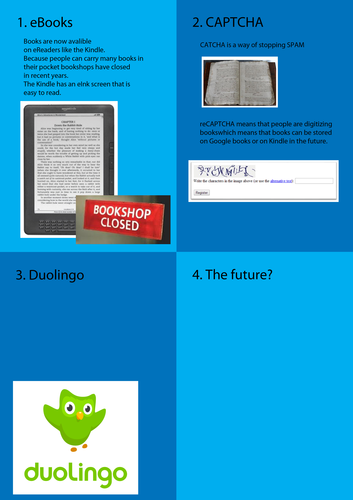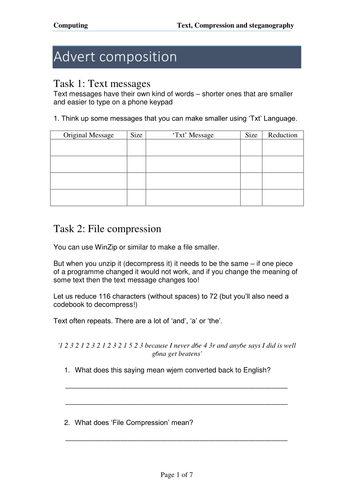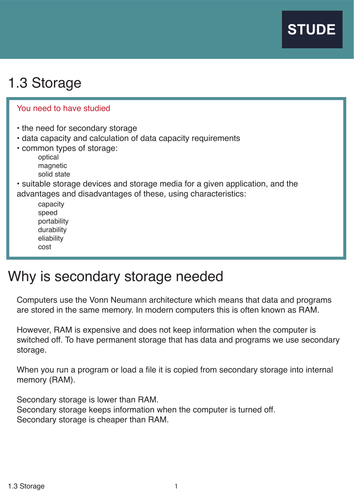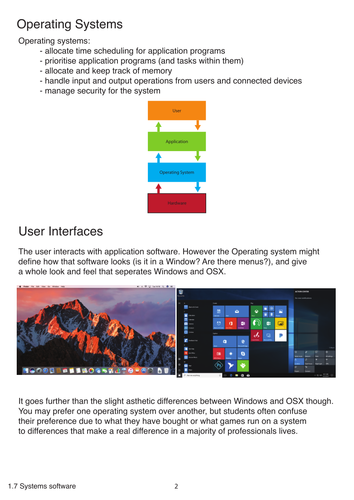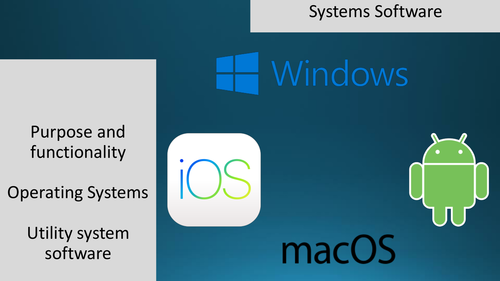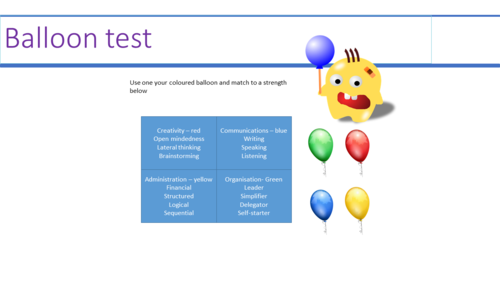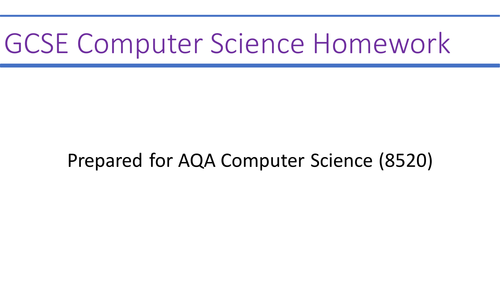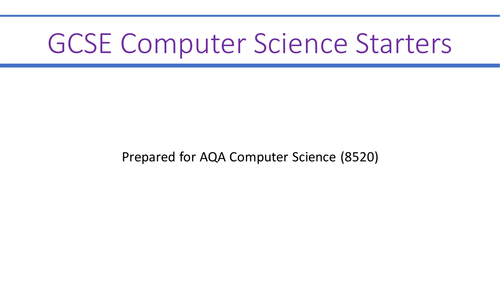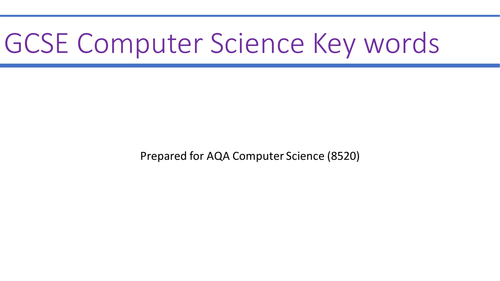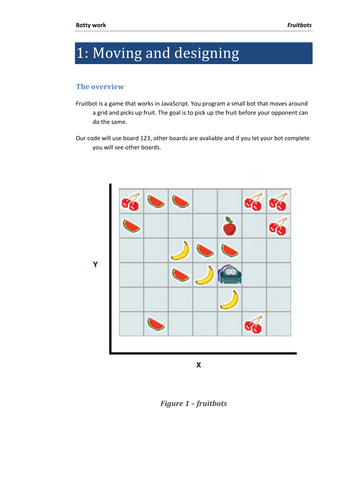
546Uploads
221k+Views
80k+Downloads
Computing

GCSE Computer Science Revision and Challenge cards for AQA 9-1 GCSE 8520
94 Computer science challenge cards that can be used to extend students. Designed for GCSE Computer Science AQA 9-1 GCSE 8520.
These cards are based on the topics that are examined in GCSE Computer science as end of class plenaries, extension tasks or flipped homework tasks.

Ethical and Legal debates for Pearson Edexcel GCSE in Computer Science
A PowerPoint presentation with over 100 ethical and legal debates for the Pearson Edexcel GCSE in Computer Science.
Helps learners study the following specification reference:
1.8 Ethical, legal, cultural and environmental concerns.
How to investigate and discuss Computer Science technologies while considering:
- ethical issues
- legal issues
- cultural issues environmental issues. privacy issues.
Written by subject specialists, with in depth debates that are relevant to students. Content covers AI, automation, gaming, privacy, hacking, security, cloud services, piracy, copyright, algorithms, emerging technology, wearable technology and more!
The pack includes a voting card that you may choose to use for students to vote, or students can move from one side of the room to another.
A great resource that can be used for starters or plenaries, and can also become the basis of an entire lesson.

Internet Safety Lesson - Managing screen time
A full set of resources for a lesson around screentime.
Covers identifying habits and behaviours (e.g., excessive screen time or video game usage) that can be detrimental to health, and explain how people can be encouraged to adopt healthier alternatives.
Resources include:
Discussions
Brainstorming
Collages
Track your screen time

Memory Lesson for OCR Computer Science
Complete lesson for Memory. Designed for OCR Computer Science (9-1) J276 but is more than useful for Computer Science students studying AQA and other exam boards.
Contains a PowerPoint presentation, and two worksheets.
Contains everything the students need to know:
the difference between RAM and ROM
the purpose of ROM in a computer system
the purpose of RAM in a computer system
the need for virtual memory
flash memory

Fetch Execute Computer Architecture Lesson for OCR Computer Science
Complete lesson for the Fetch Execute cycle. Designed for OCR Computer Science (9-1) J276 but is more than useful for Computer Science students studying AQA and other exam boards.
Contains a PowerPoint presentation, and two worksheets.

Computing Algorithms Artificial Intelligence, AI and Crowd Sourcing Lesson for KS3
A single lesson to help students understand crowd sourcing.
We are increasingly using artificial intelligence for simple tasks in the business world. Google use algorithms to digitize books. However there is something quite sinister in the way that Google are using the Crowd to work for them, often with the workers unaware that they are working for a large multinational firm.
This lesson is fully resourced and has a complete teacher’s guide. (L2Answers.docx)
There is a full lesson (L2AI2016edc.docx), and a shortened poster lesson (L2AI2016dc.docx)

Induction lesson for Computing Year 7
Ever had the problem that students come into year 7 used to their home computers and how the systems worked at their last school? Perhaps you have set up the machines with a default password and need to get them to change that, but also remember that into the coming weeks and months? This lesson has been created to help you.
WALT
• Understand the computer room rules
• Use an algorithm
WILF
• Access the school network
• Access your user area
• Present the classroom rules

Compression (Text Messages) for Computing (KS3 / GCSE)
An innovative computing worksheet.
Teaches about compression and text messages.
Developed for computing KS3 and GCSE. Moves onto Steganography.

Storage Revision Pack for OCR Computer Science
Complete revision pack for Storage. Designed for OCR Computer Science (9-1) J276 but is more than useful for Computer Science students studying AQA and other exam boards.
Contains a revision booklet for the students, and a data units worksheet.
Contains everything the students need to know:
- the need for secondary storage
- data capacity and calculation of data capacity requirements
common types of storage:
-optical
-magnetic
-solid state
suitable storage devices and storage media for a given application, and the advantages and disadvantages of these, using characteristics:
- capacity
- speed
- portability
- durability
- reliability
- cost

Systems Software Revision Pack for OCR Computer Science
Complete revision pack for Systems Software. Designed for OCR Computer Science (9-1) J276 but is more than useful for Computer Science students studying AQA and other exam boards.
Contains a revision booklet for the students, and a data units worksheet.
Contains everything the students need to know:
the purpose and functionality of systems software
- operating systems:
- user interface
- memory management / multitasking
- peripheral management and drivers
- user management
- file management
- utility system software:
- encryption software
- defragmentation
- data compression
- the role and methods of backup (full and incremental)

4.4 Software for Pearson Edexcel GCSE in Computer Science
Designed for Pearson Edexcel Level 1/Level 2 GCSE (9-1) in Computer Science (1CP1)
Covers 4.4.1 and 4.4.2

Christmas Newsletter with Publisher (KS2 / KS3)
Create a newsletter from the North Pole with Microsoft Publisher. Full instructions provided, works on both ICT and English skills for a fun session!

PowerPoint snow blizzard animation for Christmas
A PowerPoint animation guide for creating a festive snow animation using PowerPoint.

20 quick-fire GCSE 9-1 computing plenaries for AQA 8520
Saves hours of work; particularly when purchased as part of the bundle GCSE computer science without the planning.

GCSE computing Homework strategies for AQA 8520
A short section of homework strategies for GCSE computing, designed for OCR GCSE (9-1) J276

GCSE Computer Science Starters for AQA 9-1 GCSE 8520
Designed for GCSE Computer Science AQA 9-1 GCSE 8520
These starters are designed to take the effort out of planning. There are 23 different pictures. You can display the large image and ask the students their opinion about both the image and the topic in hand. The other slide is a cline around creating degrees of intensity - this is great for showing literacy in your lessons.

45 General Key word cards for GCSE Computer Science for AQA 9-1 GCSE 8520
Designed for Designed for AQA GCSE Computer Science for 9-1 GCSE 8520.
Contains 45 Key words.

Quicksort - Lesson pack
Tried and tested quicksort resources. Do not depend on any particular language, here is a presentation to help a teacher deliver the content along with worksheets.

Fruitbots Lessons for KS3 Computing
Lessons based around http://fruitbots.org/
Fruitbots enable students to explore algorithmic and computational thinking.
Suitable for both KS3 and GCSE students.

Generalisation lesson Computing (late KS3 or GCSE)
Full lesson to explain generalisation to your students
Learning objectives:
To understand that patterns are important using algorithms
To know that generalisation helps us to create programs
This is taught by tic-tac-toe and counting rectangles. An enjoyable lesson for the students.

